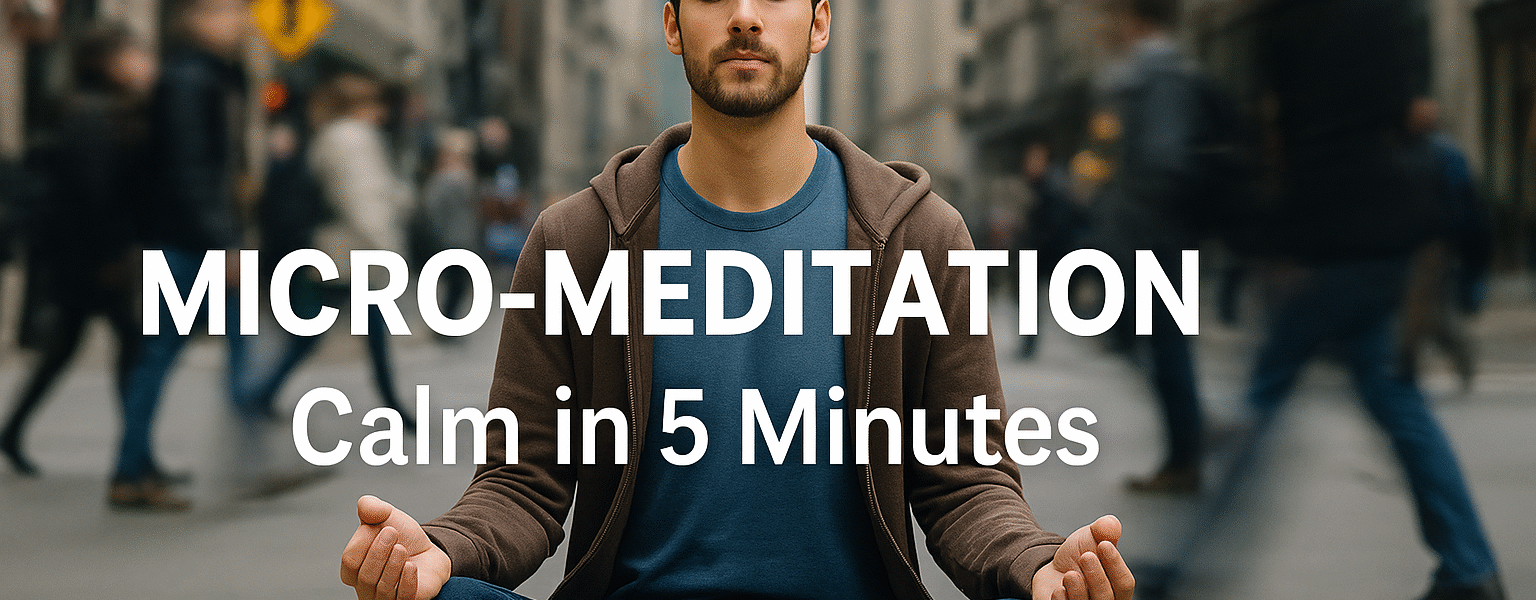Micro-Meditation: The 5-Minute Ancient Secret Revived for Today’s Busy Life — Experts Explain How Small Pauses Create Big Calm
In an era when schedules are packed, notifications ping incessantly, and multitasking has become the norm, many are finding it difficult to sit still for a full meditation session. Yet, the timeless wisdom of the Vedas and scriptural traditions upholds meditation (dhyāna) as a foundational practice for holistic well-being. Recognising this gap between ancient prescription and modern lifestyle, mental-health and mindfulness experts are advocating a micro-meditation approach: short, frequent pauses of mindful awareness that slot into busy lives while honouring the roots of meditative practice.
Why micro-meditation matters now
Traditional texts such as the Upanishads or the Yoga Sūtras emphasise sustained, focused meditation as a path to still the mind, sharpen cognition and unite the self with deeper awareness. But as one modern expert puts it: “In the busy life, the full hour isn’t always feasible — what matters is presence, however brief.”
Here are key reasons micro-meditation is relevant today:
- Constant stress barrage. The average knowledge-worker toggles tasks, apps and mindsets dozens of times a day. Micro-meditation acts as a stabiliser: short pauses break “doing” mode and reconnect you to “being”.
- Time-scarcity. Research shows even brief mindfulness or meditation interventions (5 minutes or less) can yield meaningful benefits for attention, mood and stress management.
- Better habit formation than rare long sessions. Experts argue that short, consistent interludes are more sustainable than occasional long sittings — especially for novices.
- Synergy with ancient roots. While the Vedic or yogic tradition calls for dedicated dhyāna, micro-meditation does not discard that ideal—it simply offers an entry point or complement for modern life without sacrificing the core: awareness, stillness, connection.
What research shows
- A randomised controlled trial found that four sessions of 5-minute mindfulness practices were about as effective as four sessions of 20 minutes each in reducing symptoms of depression, anxiety and stress.
- Neuro-cognitive research indicates even brief meditation/practice sessions produce measurable changes: e.g., improved attentional control, quicker conflict resolution responses in Stroop tasks, and alterations in ERP components (P200, P300) after as little as ten minutes of practice.
- Psychological-medical commentary notes that micro-meditation helps the mind shift out of negative rumination and into a “neutral state” of awareness, aiding with anxiety, sleep disturbance and attention lapses.
In short, the empirical evidence supports the idea that how often you pause for mindfulness may matter more than how long each break is — provided you give yourself genuine attention during that pause.
How to incorporate micro-meditation (step-by-step)
Here’s a practical framework suited for busy schedules:
- Choose triggers/cues. Use natural breaks such as before a meal, after a phone call, while waiting for an elevator, or during a short commute. According to a recent expert interview, you might “sit comfortably, close your eyes and take three slow, deep breaths” to begin.
- Keep it short and focused. Aim for 1–5 minutes. Focus on breath, bodily sensations or simple awareness of thoughts passing by—not on judging or controlling them.
- Be consistent. A daily sequence of short pauses builds neural and behavioural benefits over time. Quality matters more than duration. As one expert puts it: “You can meditate for a long time without being too invested … but if you take just a little time and fully invest your attention, that could be more beneficial.”
- Mind the non-multitasking rule. Give your micro-meditation your full attention—even if brief. Avoid switching devices or engaging in other tasks simultaneously.
- Link to deeper practice. If you maintain micro-meditation, consider extending into 10-15 minute sessions on weekends or at a regular dedicated time — aligning closer with traditional meditation frameworks.
Bridging tradition and modernity
The Vedas, Upanishads and yogic texts present meditation not just as a relaxation tool, but as a path to inner transformation, self-realisation and liberation from mental fluctuations. For example, in Vedānta, the state of dhyāna is characterised by an unbroken flow of awareness.
Micro-meditation doesn’t replace that deeper vision. Rather, it acts as a pragmatic bridge — enabling modern individuals to maintain a thread of meditative presence even amidst bustling schedules. In other words, micro-meditation is not a “lesser version” of meditation; when done well, it sustains the habit, reduces friction, and keeps the doorway open to the deeper states envisaged in traditional practice.
Potential limitations & caveats
- Quality over quantity still holds. A poorly attended 1-minute break may not yield much; the key is genuine presence.
- Micro-meditation should not be the only strategy if one finds that stress, anxiety, sleep issues or attention problems persist — longer dedicated sessions, professional guidance, or therapy may then be needed.
- It is complementary, not contradictory, to scriptural practice. For those inclined towards deeper-seated meditation, micro-pauses are a supportive tool, not a substitute for dedicated dhyāna.
Final word
In today’s fast-paced world, the ideal of long hours of meditative stillness may feel out of reach. But the ancient insight remains: the mind thrives when awareness meets calm. Micro-meditation offers a scientifically and practically validated method to plug pauses of presence into our lives, supporting better focus, emotion-regulation and mental resilience. As research suggests, “five minutes a day, every day” may well be far more powerful for many than “half an hour once a week.”
Whether you’re commuting, in waiting rooms, or just pausing between tasks, try a simple conscious-breath pause today. In the words of the ancients: as the mind becomes still, the Self reveals itself. And in our busy age, that stillness may begin with just a few mindful moments.
micro-meditation, meditation for busy people, 5-minute meditation, modern mindfulness techniques, micro meditation benefits, expert meditation tips, meditation from Vedas, stress relief techniques, short meditation practices, ancient wisdom modern life, holistic health habits, daily mindfulness, mini meditation routine
#MicroMeditation #Mindfulness #StressRelief #VedicWisdom #MeditationPractice #MentalHealth #Wellness #HealthyLiving #BusyLifeBalance #MeditationTips #MindfulMoments #SelfCare #AncientWisdomModernLife #HealthNews #HolisticWellness
Discover more from
Subscribe to get the latest posts sent to your email.











2 COMMENTS